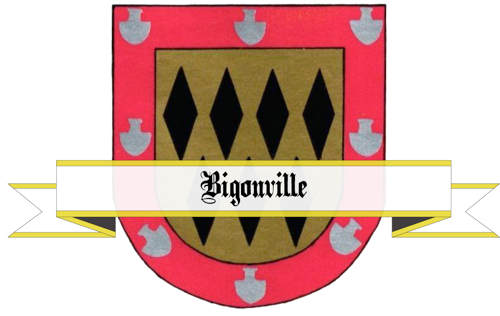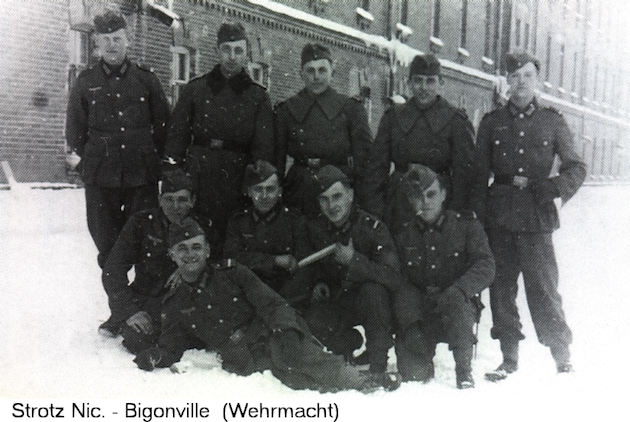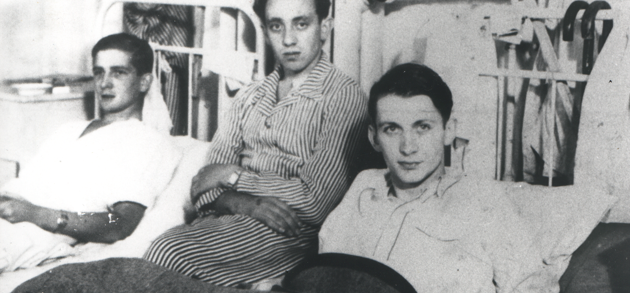Kriegserlebnisse 1942-1945
Ich, Joseph Strotz aus Bondorf, geboren am 23.10.1922, wurde am 6. Oktober 1942 in den Deutschen Reichsarbeitsdienst gezwungen und auf die Halbinsel Peenemünde an der Ostsee dienstverpflichtet. Wir mussten Gräben ausheben, Kabel ziehen, Rasenstücke abheben und auf die unterirdische Fabrik auflegen, wo zur Zeit die neue Wunderwaffe V1 gebaut und ausprobiert wurde. Wir sahen die ersten Raketen in den Himmel hinaufschiessen und dann verschwinden.
Die Verpflegung im R.A.D. Lager war knapp, doch die Pakete aus der Heimat liessen uns keinen Hunger leiden.
Am 27. Dezember 1942 aus dem R.A.D. entlassen, wurde ich am 17. Januar 1943 nach Ansbach zur Wehrmacht eingezogen. Der revoltierende eigene Willen wurde gebrochen und durch das Denken der deutschen Machthaber ersetzt. Ich wurde ausgebildet am S.M.G., als Panzergrenadier und am Granatwerfer. Unsere Einheit bestand zum Teil aus 1/3 Luxemburgern, sowie 1/3 Elsässern, der Rest waren deutsche Soldaten.
Nach Beendigung der Ausbildung und nach einem Kurzurlaub kam ich Ende April 1943 an die russische Front zur Entlastungsarmee, welche bei Stalingrad geschlagen worden war. Im Viehwagen fuhren wir bis zur Krimhalbinsel, setzten in Booten über die Meerenge von Kersch und marschierten im 60 km Tagestempo durch den Kaukasus bis in die Gegend von Amawir, wo wir in Stellung gingen.
Die erste Begegnung mit der Front, sowie der erste Kontakt mit Toten und Verwundeten war schrecklich. Nach 3 Monaten dauerndem Kampf in den ersten Linien, wurde ich am 26. Juli 43 durch eine Panzergranate verwundet. Ich bekam einen Stecksplitter in die linke Stirnseite, sowie einen Granatsplitter durch den Mund, wobei neun Zähne herausgerissen und die Zunge gespalten wurde. Ich verlor das Bewusstsein, erwachte erst in einem Erdbunker hinter der Front, aus meinem Munde quoll dunkles, halb geronnenes Blut und auf dem Kopf hatte ich immer noch den Stahlhelm mit dem darinsteckenden Granatsplitter. Als ich die ersten Lebenszeichen von mir gab, wurde ich sofort operiert. Ohne irgendeine Betäubung wurden mir die zersplitterten Zähne gezogen und die gespaltene Zunge genäht. Dass ich dabei das Bewusstsein wieder verlor, ist kein Wunder. Am gleichen Tage wurde ich mit einem Flugzeug (Storch) vom Feldflughafen Noworossijsek nach Sewastopol auf die Krim geflogen. Im Lazarett wurde meine Kopfwunde operiert und eine kleine Goldplatte an der linken Stirnseite eingesetzt sollte das Gehirn am Anstossen hindern. 3 lange Wochen konnte ich nicht sprechen, nichts essen und wurde dann durch Spritzen ernährt. Nach 4 Wochen, als ich transportfähig war, wurde ich zum Bahnhof gebracht zum Abtransport via Heimat. Im Bahnhof von Sewastopol traf ich auf meinen Bruder Nick, der mich von sich stiess, als ich ihn umarmen wollte. Er erkannte mich nicht, weil mein Kopf verbunden war und mein Kiefer mit einem Apparat zusammengehalten wurde. Erst durch meine Armbanduhr, die er als die seine erkannte, und durch den Sanitäter, der ihm meinen Namen sagte, wurde ihm alles klar und wir fielen uns in die Arme.
Dann traten wir gemeinsam die Heimreise durch die Ukraine an. In einem Lazarett bei BRESLAU wurden wir gesund gepflegt, was 7 Monate dauerte.
Den Genesungsurlaub in der Heimat Bondorf nutzten wir um im Untergrund zu verschwinden. Eltern und Geschwister sollten wegen unserer Fahnenflucht umgesiedelt werden und entzogen sich der Umsiedlung durch das Untertauchen. Bei Nachbarn und Freunden waren wir im Dorfe selbst versteckt und kamen bei der Befreiung am 10. September 1944 alle 6 gesund und munter wieder zum Vorschein.
Während unserer Abwesenheit wurde durch die Deutschen eine Familie aus Kroatien in unser Haus einquartiert, die aber kurz vor der Befreiung wieder abzog.
Jos. Strotz
[Translation]
War Experiences 1942-1945
I, Joseph Strotz of Bigonville, born on November 23, 1922, was drafted into the German Labor Service on the 6th of October, 1942, and was stationed on the Peenemunde Peninsula on the Baltic Sea. We had to dig ditches, install cables, remove grass and place it on top of the underground factory where, at that time, the V1 Miracle Weapon was being built and tested. We saw the first rockets rise into the sky and then disappear.
The rations in the R.A.D. were skimpy, although packages from home prevented us from being hungry.
On the 27th of December, 1942, having been released from the R.A.D., I was drafted into the Wehrmacht in Ansbach on January 17, 1943. The resistance of my will was broken and replaced by the thoughts of the German rulers. I was trained as a gunner for heavy automatic weapons (S.M.G. machine-gunner), as an Armored Infantryman and as a mortarman. Our unit consisted at the time of about 1/3 Luxembourgers, as well as about 1/3 Alsatians, and the rest were German soldiers.
After completion of the training, and after a short leave, I arrived at the Russian front in April of 1943 to join the defensive force which was being attacked around Stalingrad. In cattle cars we traveled to the Crimean peninsula, went by ship through the Strait of Kersch, and marched at 60 kilometers per day through the Caucasus Mountains to the vicinity of Armavir, where we took up positions.
The first experience at the front, and the first contact with the dead and the wounded, was frightful. After three months of front-line combat, I was wounded by a tank shell on the 26th of July, 1943. I received a shell fragment in the left side of the forehead, and a mortar fragment in the mouth which tore out nine teeth and split my tongue. I lost consciousness and then came to in an earthen bunker behind the front. From my mouth dark, half-coagulated blood was flowing, and on my head I was still wearing my steel helmet with the mortar fragment embedded in it. When I showed the first signs of life, I immediately underwent surgery. With no anesthetic my shattered teeth were extracted and my split tongue was sewed up. It is no wonder that I lost consciousness again as a result. On the same day I was transported by plane (a Storch) from the airport at Novorossisk to Sevastopol in the Crimea. In the field hospital they did surgery on my head wounds and a small gold plate was embedded in the left side of my forehead to prevent pressure on the brain. For three long weeks I could not speak or eat, and I was fed through injections. After four weeks, when I was capable of being moved, I was taken to the railroad station for shipment home. At the Sevastopol station I met my brother Nick who pushed me away from him when I tried to embrace him. He did not recognize me because my head was all bandaged up and my jaw was held together with immobilizing equipment. Only because of my wristwatch, which he recognized as his own, and through the nurse, who gave him my name, did everything become clear, and we fell into each others arms.
Then together we made the journey home through the Ukraine. In a hospital in Breslau we were nursed back to health, and that took seven months. The recovery leave in our home town of Bigonville required that we disappear into the underground. Our parents and siblings, because of our desertion, were to be resettled, and escaped the resettlement only by going underground also. We were hidden by friends and neighbors in the town, and were liberated on the 10th of September, 1944. when all six of us came out into the open again, healthy and happy.
During our absence, thanks to the Germans, a family of Croatians were quartered in our house, but shortly before the liberation they took off.
Jos. Strotz


